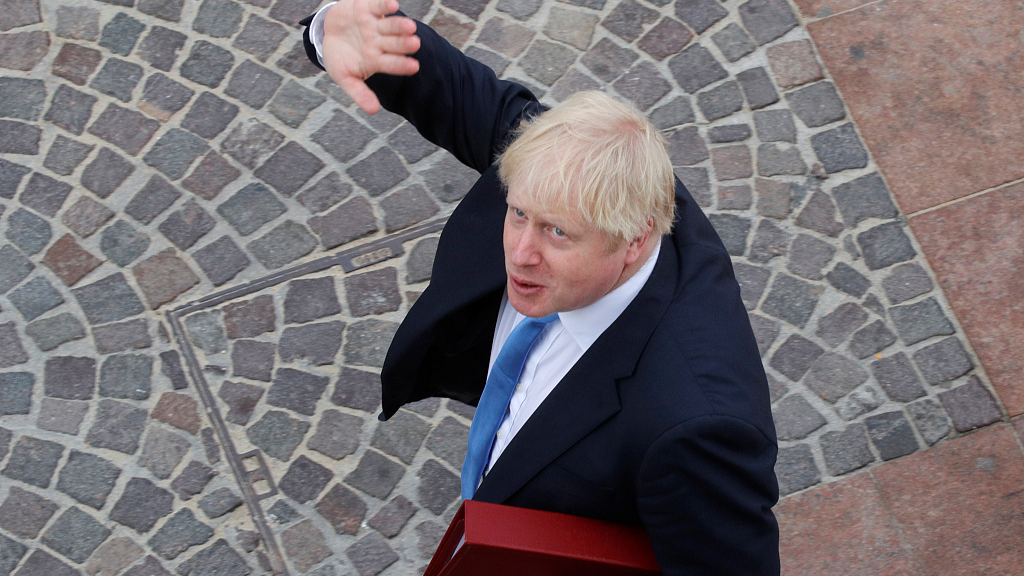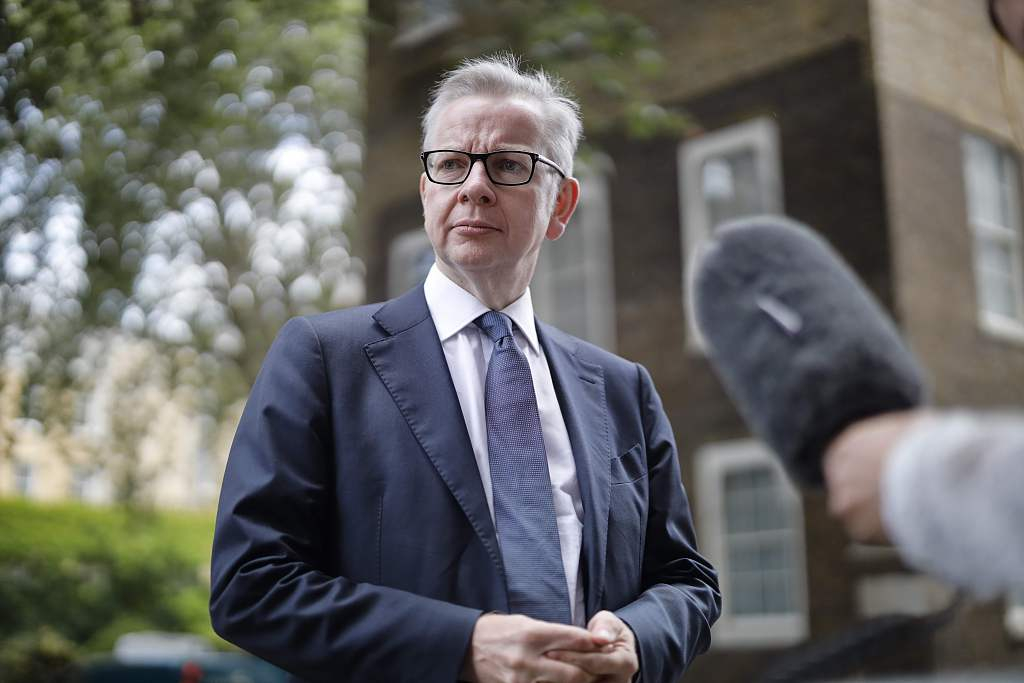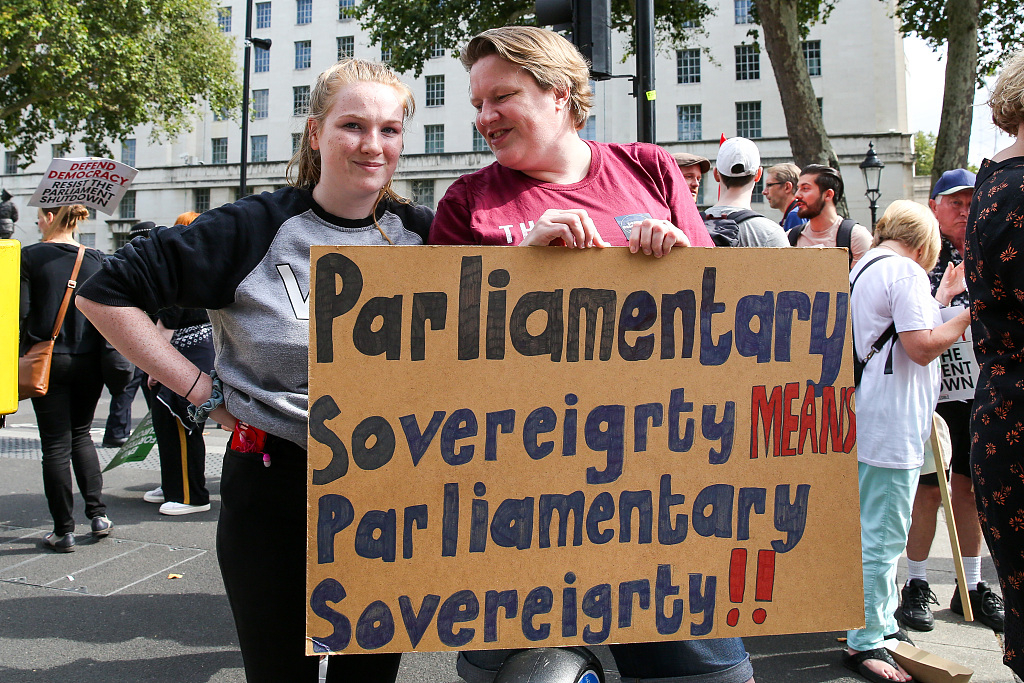

Editor's note: Chris Deacon is a postgraduate researcher in politics and international relations at the University of London and previously worked as an international commercial lawyer. The article reflects the author's opinion, and not necessarily the views of CGTN.
In recent days, there has been concerned speculation that Boris Johnson's government is contemplating refusing to follow the law in the run up to the Brexit deadline in October 31. This possible action appeared to be confirmed over the weekend, producing further worries of a crisis in British politics in the coming weeks.
As Members of Parliament (MPs) who are opposed to a no-deal Brexit try to avoid this eventuality, two broad options have emerged: Either to legislate to require an extension to the Article 50 period, or to bring down the government and install a new, interim government which would carry out the extension.
In the first option, MPs would pass a law in Parliament that would require Boris Johnson to go to Brussels to seek an extension – as occurred earlier in the year when Theresa May was still prime minister. Theoretically, once this instruction became the law of the land, Johnson would be unable to continue pursuing a no-deal Brexit.
In the second option, MPs would pass a no-confidence motion in the government. There would then be attempts to form another government – without the holding of a general election – which could command a majority within the House of Commons. While provided for under law, this would also require Johnson to vacate 10 Downing Street and recommend an alternative prime minister to the Queen.
Both of these options, however, require that Johnson's government actually follows the law. Generally, this is not a problem that has been of concern in the past, as there has been little fear that a prime minister or their government would refuse to do so – but this now appears to be a distinct possibility.
Britain's Chancellor of the Duchy of Lancaster – and prominent supporter of Johnson's strategy – Michael Gove appeared on the BBC's Andrew Marr Show on Sunday and refused to confirm that the government would follow any law passed by MPs attempting to block a no-deal Brexit. He simply stated "let's see what the legislation says."

Britain's Chancellor of the Duchy of Lancaster Michael Gove speaks to reporters outside 10 Downing Street, London, UK, August 6, 2019. /VCG Photo
This was a somewhat shocking admission by a minister – that his government might actually subvert the law of the land. It is particularly shocking given one of the very arguments made in favor of Brexit, including by Gove himself, was to restore "parliamentary sovereignty" in the UK. To then advocate flouting the wishes of Parliament is somewhat hypocritical, to say the least.
This comes in the context of Johnson's decision to "prorogue" Parliament – i.e. shut it down – for a period of five weeks across September and October; already damaging MPs' hopes of legislating to avoid no-deal by dramatically decreasing the time they have available to do this.
However, to go one step further by suggesting that, even if MPs pass their law, the government will just ignore it anyway is a severe escalation. The government would not just be in contempt of Parliament but would be acting illegally.

Two women hold placards outside 10 Downing Street demonstrating against Boris Johnson's plans to suspend UK Parliament for five weeks, London, UK, August 31, 2019. /VCG Photo
Similarly, in regard to the no-confidence motion, Downing Street insiders have also told journalists that, even if they lose such a vote in Parliament, they will "sit tight" and refuse to recommend any alternative prime minister to the Queen. Again, this would be a shocking dereliction of constitutional responsibilities and, perhaps, might even draw the Queen into making a political decision – something that has been avoided for centuries.
Whether Johnson's government is serious about acting in this way remains to be seen. However, the very fact that it appears to have become a standard behavior for the government to threaten such a move shows the sorry state that politics in the UK has come to in recent months. For the "mother of parliaments" – and, indeed, the law of the land – to be willfully ignored by the government would set a deeply concerning precedent for the future.
Boris Johnson and his government must think long and hard about whether pursuing this course is worth the damage it could do to their country in both the short and long term. Even ignoring one's views on Brexit, and whether that is the right path for the UK or not, to execute it in this way cannot be advisable under any circumstances.
(If you want to contribute and have specific expertise, please contact us at opinions@cgtn.com)

Copyright © 2018 CGTN. Beijing ICP prepared NO.16065310-3
Copyright © 2018 CGTN. Beijing ICP prepared NO.16065310-3